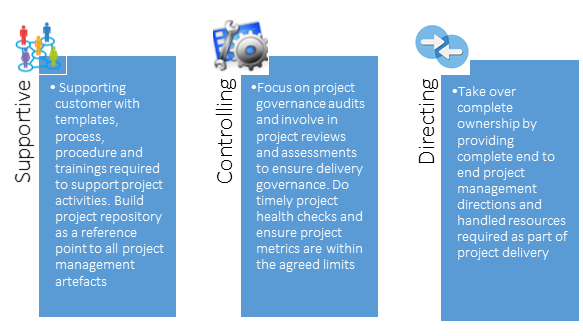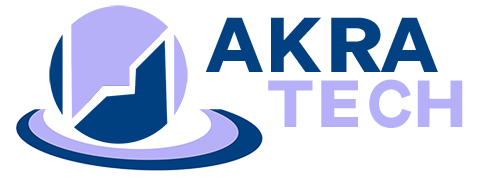In today’s project environment there is an increasing demand for PMO strategic/governance services which should be comprehensive providing overall business value across the whole portfolio with focused approach to continually ensure and optimize the allocation of resources to match business priorities.
PMO is focused on influencing the use of project management principles across multiple projects, successful PMO provides a cross-functional perspective by considering all projects and their implications across project boundaries.
Many organizations profit hugely by utilizing a PMO, it means they achieve benefits from standardizing and following project management policies, processes, and methods.
Building an effective PMO is a complex process; it requires clear vision and strong leadership so that, over time, it will become the source for guidance, documentation, and metrics related to the practices
PMO helps to plan and sequence projects on priority set by the business, thereby ensuring governance team track programs or projects end-to-end from signoff till successful closure.
Effective PMO services will help track Issues and risks and plan corrective and preventive actions appropriately. Program and project level service metrics can be established through PMO setup and the same can be measured throughout the Project life cycle. Besides we can establish and manage Quality Assurance across various business units within the organization
PMO Structures – Models
PMO model will be decided and setup based on the requirement and magnitude of business. The team structure will be formed during the PMO setup stages.

Following are the various process areas that are handled within a PMO
Financial Management
- Collate data on defined Cost Centre
- Analyse results; Support financial outlook creation;
- Support WBS structure creation and maintenance
- Maintenance of Financial Sheet(s) (Budget vs. Actual) at each project or program level
- Maintenance of financials at the Portfolio level
- Assist in Management information presentations with the accurate data points and facts
- Assisting Project Managers in financial outlook and forecasting
- Reporting on highly sensitive or high-risk projects
- Analyzing budgets and forecasts and driving improvements in the trend
- Provide management with information necessary to make strategic decisions in terms of budget and forecast
- Raising early warning signs for the projects at higher risk
Communications Management
- Meeting management: agenda, minutes, document management, status reporting
- Report on actual dates, efforts, and costs compared to baselines from the schedules
- Advising and supporting leadership team communication activities
- Maintain the effective dashboard which demonstrates the effectiveness of project information distribution to senior management
- Coordination of communication activities with central communication activities
- Validate the process and seek the improvements to enhance the productivity of SFLs by redefining the process
- Ensure Project Performance reporting is derived and delivered to each stakeholder by SFL community
- Conduct random audit to ensure Communication process are in place for each project
- Weekly and Monthly Critical project reports – Time tracking report which highlights the weekly time spent on various projects by resources across the globe
- Capturing metrics for various Segment’s and perform quality checks, follow up and get data corrected/updated as appropriate
- Vendor Management RAG status updates
- Identify the improvement areas and enhance the current reports
- Identify gaps in business verticals/business groups and establish new processes which will showcase their presence.
Risk management
Support the Program and Project with the creation, updating, monitoring of the project risk and issue log. Facilitate the identification, analysis, mitigation of project risks and issues. Regular reviews of the risk and issue log
- Own the responsibility of end to end Risk Governance at PMO Level for each project
- Own Risk/Issue management process & handle any PMO request pertaining to Risk/Issue
- Assess Top XX risks on Qualitative & Quantitative in numbers
- Ensure project plans reflect the response plan for each type of risk (threat/opportunity)
- Review the Risk register at least weekly once with PM community and provide the feedback
- Log Issues and identify the potential factors whether program/portfolio could impact with similar kind of issues.
- Consolidate the risk at each Portfolio level and send it to stakeholders on weekly basis
- Easily accessible to PM community, in case if they need any support on assessing risks/Issues
- Identifying additional responsibilities to grow the team
Schedule Management
- Manage and maintain Program level schedules derived from project schedules.
- Standardized & custom project schedules on the project level, support to the project managers in keeping the plans up to date by reporting the status, changes, and inconsistencies according to the plans.
- Quality reports that show the deviations regarding the schedule standards define
- Implement governance structure and management of Schedule practices and process
- Identifying additional responsibilities to grow the team
- Escalate through appropriate channel if any SFL is not provided the project schedule
- Identify schedule variances on the schedule reported
- Advise SFLs various schedule compression techniques
- Facilitate the meeting with all SFL and PMO Lead on regular meeting
Quality Management
- Program and Project Health check audit to any account based on Quality standards
- Determine if a project or program is compliant with relevant quality standards
- Identifying ways to eliminate causes of unsatisfactory performance.
- Project Charter received from client with the requirements
- Project Scope finalized and client approved scope document
- Schedule weekly meetings with the project team and customer
- Provide weekly status report to the customer highlighting the achievements of the previous week and upcoming activities for the next week
- Scope change to be formally provided through RFC from a customer. Project to be re-baselined accordingly and the same to be approved by customer
- Monitor cost, schedule, scope continuously and changes to be re-baselined
- Lessons learned document is in place for major projects
Stakeholder Management
- As a key to successful PMO governance, Stakeholders will be identified and engaged at the right time.
- Client representatives, Vendor/ Supplier contacts and Internal Stakeholders like Platform Leads will be engaged.
- Governance team will ensure the good relationship & rapport between different stakeholders.
- Any Issues/ Conflicts are to be brought to the attention of Governance
Benefits
- Maintain in-depth visibility across all spend, both lights-on and discretionary
- Integrate all portfolios and mapping to customer’s business model
- Ensure high-quality demand is generated from analysis of business capabilities/products
- More emphasis on tracking project financial performance & maximizing ROI across the investment portfolio
- Identify gaps in realization of strategic objectives
- Ensure effective communications to relevant stakeholders
- Improve monitoring and control of projects
- Increase efficiency in tracking progress of projects
- Integrate project plans for all Projects– Standardizes progress reporting.
- Timely Identification and escalation of risks.
- Simplification and streamlining of existing processes to ensure project compliance and progress
- Establish a standardized ‘Scope change’ process to reduce cost disputes arising due to scope changes
- Establishing an internal escalation process and matrix to handle any non-compliances from SFLs
- Encourage and maintain timely reporting from PM’s
- Conduct Process training through PM handbook which inducting new team members
- Planned Project audits to check and ensure data compliance
- Possible automation for improvement in processes and reporting
- Automating and refining existing processes to reduce time and effort
- Create robust processes enabling better visibility towards Cost management
